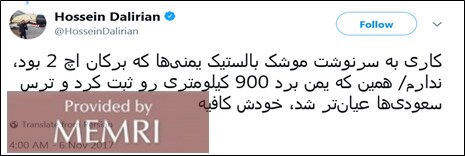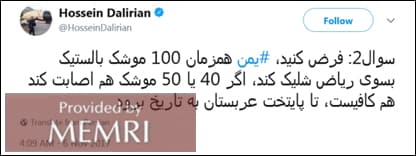The day after the November 5, 2017 firing of a long-range ballistic missile from Yemen at Riyadh, the Saudi capital, the Iranian daily Kayhan, the mouthpiece of the country's ideological camp, published a front-page article containing threats that more missiles would be aimed at Saudi Arabia and the UAE by the pro-Iran Houthi militias in Yemen.[1]
Additionally, Hossein Dalirian, military correspondent of the Iranian news agency Tasnim, which is affiliated with Iran's Islamic Revolutionary Guards Corps (IRGC), tweeted in jest about the possibility of dozens of missiles being fired from Yemen at Riyadh, and of Iranian missiles being fired directly at Saudi Arabia in the event of a war between the two countries – eradicating Riyadh.

Kayhan's November 6, 2017 front page. Headline reads: "Ansar Allah [Houthi] Missile Fired At Riyadh; Next Target: Dubai"
The following is the translation of Kayhan's November 6, 2017 front-page article, and of the tweets by Tasnim military correspondent Dalirian about massive missile attacks on Riyadh by Yemen and Iran:
Kayhan's November 6, 2017 Front Page Article: "Ansar Allah [Houthi] Missile Fired At Riyadh; Next Target: Dubai"
"A long-range Scud missile [fired by] the Yemen army and its popular militias struck the international airport in the Saudi capital. This [firing of the missile] shook the regime of the Aal-Saud [family], which is made of straw, and seriously worried the Riyadh rulers.
"On March 25, 2015, the Aal-Saud [regime] launched its first aerial attack against the defenseless women and children in Yemen. It never thought that 32 months later it would be so humiliated and pressured.
"On Saturday night, the Burkan 2H missile belonging to the Yemen army and Ansar Allah split the skies of Riyadh and landed like lightning on King Khaled International Airport. This missile struck and shook the entire city, even its surroundings. As a result of the explosion, thick smoke enveloped the skies [above] the airport. This cost the pampered Saudi king and princes dearly, and even caused concern to the sheikhs in Abu Dhabi and in Dubai port, which is made of glass. They now realized that the threats by Abd Al-Malik Al-Houthi, the Ansar Allah leader in Yemen, were absolutely serious, and that the Yemeni missiles had both range and precision strike [capability]...
"From now on, the princes who laid their hands on all the riches of the Saudi people will enjoy no peace in their luxurious palaces. They must accept the new situation, or flee their country. Even the UAE has realized that its turn has also come to pay the price for attacking Yemen.
"Disturbing Developments Are On The Way
"The missile attack on Riyadh revealed that Saudi Arabia's military capability is lower than experts thought. Following the attack, the Saudi media first said that the [Saudi] anti-missile system had intercepted the missile while it was still in the air. But a few hours later, elements at King Khaled airport acknowledged that the missile had struck its target. Nevertheless, not a word was published in media reports about damage caused.
"This shows that America has abandoned Saudi Arabia when there is real danger – or, more accurately, that America cannot do a thing for Saudi Arabia.
"Following the missile strike, the spokesman for Ansar Allah in Yemen reminded the aggressive Saudi coalition: 'We have often said that the capitals of our enemies are within range of our ballistic missiles.'
"These threats and declarations show well that the situation in the region has changed, and that from now on, not only is Saudi Arabia not a safe region for Western investment, as it once was, but neither are Dubai and Abu Dhabi – even if they are not harmed.
"In addition to the arena of the fighting in western Asia [the Iranian term for the Middle East], also in the political arena we are seeing that in recent days the Aal-Saud regime and its allies in the region and in the West are making aggressive anti-Yemen and anti-Iran statements. Just a few hours before the Ansar Allah missile struck Riyadh, Sa'ad Al-Hariri stepped down from the premiership of the Lebanese government, and made unrelated anti-Iran statements.
"In the past few days, an American security element visited Damascus.[2] No one knows what this official said to the Syrian elements, but the Al-Rai Al-Yawm newspaper, which is published in London, noted that this senior American official told Syrian elements that America officially recognizes the Syrian [i.e. Assad] regime.
"These developments in the region are in addition to the defeat of the takfiris [the Iranian term for the Islamic State (ISIS)] which for the past decade has been financed and maintained by Saudi Arabia. None of these bode well for the Aal-Saud regime.
"The truth is that the region is preparing for great developments, and that it seems that post-ISIS, Saudi Arabia must be the victim of this great development. Muhammad bin Salman is a candidate for the [Saudi] monarchy, but he is encountering many problems both at home and abroad, and therefore some experts say that he will not succeed and will never reach the throne.
"In addition to the economic pressure and the power struggle within the family, Muhammad bin Salman must also count the Ansar Allah missiles in the Saudi skies...
"In any event, it is now Ansar Allah and the revolutionaries in Yemen who will determine where the [next] long-range missile should strike. Maybe Riyadh, Jeddah, Taif, or Aramco will be the next targets; maybe Ansar Allah will aim the warhead at Dubai port, which is made completely of glass. No matter what, the authority is in the hands of the revolutionaries in Yemen."[3]
Tweets By Correspondent For IRGC-Affiliated Tasnim News Agency: Missiles From Iran And Yemen Will Make Riyadh "History"
Also on November 6, Tasnim's correspondent for military affairs, Hossein Dalirian, tweeted threats that Yemen and Iran would fire missiles at the Saudi capital:
"Saudi Arabia fired 5 Patriot missiles to intercept the missile fired from Yemen at the Riyadh airport. Each of these missiles cost $3 million #fear #weakness"

"We will not deal with what happened to the Yemeni Burkan 2H ballistic missile. It is enough that Yemen [achieved] a range of 900 km and that the Saudi fear was revealed even more [clearly]."

"Question: Could Riyadh's defense apparatuses cope if Yemen simultaneously fired 20 ballistic missiles? Would there be any remaining Patriot missile to deal [with them]?"

"Another question: If Yemen simultaneously fired 100 ballistic missiles at Riyadh, would it be enough for 40 or 50 of them to strike it to make the Saudi capital history?"

"And a final question: If Saudi Arabia fought Iran, what catastrophe would a massive firing of Iranian missiles on the Saudi airports, bases, and military bases wreak on the first day of the war?"

"I will explain no more; whoever knows understands what I am saying... #ballistic_missile #Iran #SaudiArabia."[4]

[1] It should be noted that the Kayhan piece prompted a warning by Iran's Press Council, which is subject to the Culture Ministry of the government of Iranian President Hassan Rohani, saying that it had harmed Iranian national interest and banning publication of Kayhan for two days, November 11-12. The next day, November 7, 2017, Kayhan discussed this warning at length, and clarified that the threats were presented on behalf of the Ansar Allah movement, that is, the Houthis – and not on behalf of Iran itself. The paper also expressed amazement as to why Iran's pragmatic circles, represented by the Rohani government, were chastising it instead of rejoicing that Saudi Arabia and the UAE, which were harming the Yemeni people, were being threatened with missiles. Kayhan, Iran, November 7, 2017.
[2] See MEMRI Special Dispatch No. 7163, Lebanese Daily Close To Syria: Senior U.S. Official In Secret Visit To Syria To Discuss Missing Americans, Including CIA Agents, November 5, 2017.
[3] Kayhan (Iran), November 6, 2017.
[4] Twitter.com/Hossein Dalirian, November 6, 2017.




